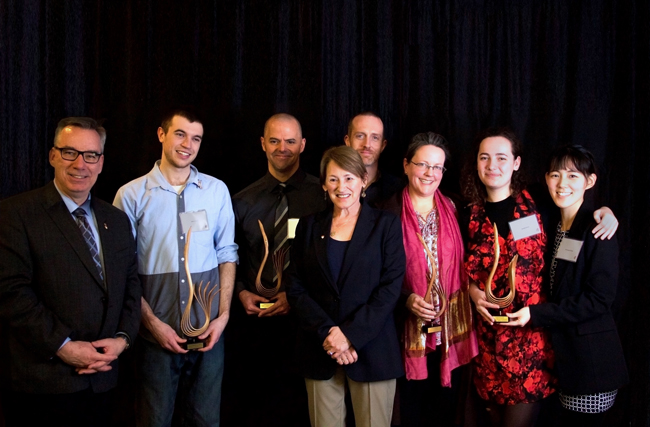
By McGill Reporter Staff
On April 3, the McGill Office of Sustainability (MOOS) hosted its seventh annual Catalyst Awards Gala. Over 100 people gathered at the McCord Museum to celebrate individuals and teams who have made lasting contributions to the sustainability of the University.
Principal Suzanne Fortier described the awards as honouring McGill’s own “bright spots”: shining examples of hope and possibility in a world so often characterized by darkness and uncertainty.
To put the principles embodied by the award recipients into practice, the Gala itself was the first McGill event to use the Sustainable Events Guide and be “certified Gold” by the newly created Sustainable Events Ambassadors team.
Professor Yves Beauchamp, Vice-Principal Administration and Finance, expressed that the accomplishments celebrated at the Catalyst Awards are sources of great pride and inspiration. “The people honoured here tonight have found ways to work together – across departments, roles, and traditional responsibilities – to create truly remarkable changes in the way our University is run,” he said.
The coveted Emerald Key Award for student contribution to sustainability was presented to John Lindsay, a U3 student studying Environmental Science in the Faculty of Agricultural and Environmental Sciences.
Marisa Albanese, Interim Executive Director of Student Housing and Hospitality Services, and Professor Julia Freeman, who presented Lindsay with the award, described him as a student who exhibits genuine passion for the wellbeing of people and the planet both in the classroom and in his extracurricular pursuits.
Academically, Lindsay used lessons learned from his multi-disciplinary environment program to create two research courses to study sustainable institutional food procurement. Through his work as Food and Dining Sustainability Coordinator, Lindsay has expanded the scale and impact of food and waste education initiatives. He also improved food procurement auditing and reporting to better assess and actualize changes in institutional food procurement. In addition, he has taken great interest in improving the scope and impact of fair trade products on campus. These efforts were recently recognized when McGill received the Fair Trade Campus of the Year Award.
Suzanne Smith, Director of the Office of Ethics and Compliance presented the Catalyst Award for Connectivity, Governance and Administration to the Supplier Code of Conduct, an initiative that establishes and communicates the social, ethical and environmental principles that McGill suppliers must meet in order to conduct business with the University.
Procurement Services adopted its first Procurement Policy, its first Strategic Plan for Sustainable Procurement, and now, its first Supplier Code of Conduct, which applies to all McGill suppliers. The Supplier Code of Conduct highlights the importance of respecting internationally recognized human rights, labour standards, basic animal freedoms, as well as business transparency mechanisms and the commitment to more sustainable supply chains.
The Catalyst Award for Research and Education was presented by Executive Chef Oliver de Volpi to the Student Housing and Hospitality Waste Educator Program.
This initiative stations student educators in all residence cafeterias to teach new McGill students how to reduce their impact through proper recycling and composting. Reaching almost every first-year residence student in the first two weeks of the school year, demonstrating McGill’s commitment to sustainability from day one. This year, the program has contributed to a 42 per cent increase in compost collection, more than 80,000 liters of agricultural-grade soil created and 190 tonnes of greenhouse gas emissions reduced. This would not have been possible without the dedicated and continual efforts of the Waste Educators.
The Associate Vice-Principal (Facilities Management and Ancillary Services) Robert Couvrette presented the Catalyst Award for Operations to the IT Asset Management Regulation.
This project represents the University’s first initiative to optimize the “gate to gate” life cycle of its IT assets by effectively operationalizing McGill’s 4-R Hierarchy (Rethink, Reduce, Reuse, Recycle). Under the IT Asset Management Regulation, minimum standard requirements have been adopted so that new IT equipment contain fewer toxic components, contain greater recycled content, and consume less energy. McGill’s computers are now tracked, main IT flows (computers, displays and cell phones) are subject to reuse within the University, or are refurbished for reuse outside the University, when possible.
The IT Asset Management Regulation came about from the close collaboration between Procurement Services, IT Services and Facilities Management and Ancillary Services. It now serves as the blueprint for the development of other asset management initiatives at McGill.

You named the winners in all the categories except for Operations. Was that intentional or just an oversight?
The article didn’t list the winners of the operations award because, technically, it to a project and not individuals. The article also didn’t name the individuals for the Research & Education award.